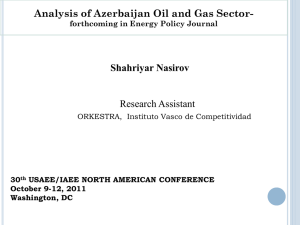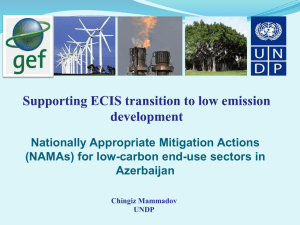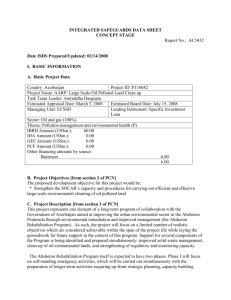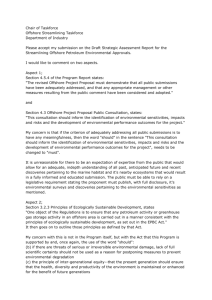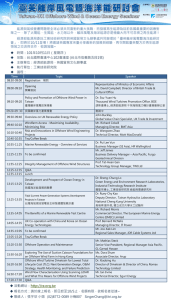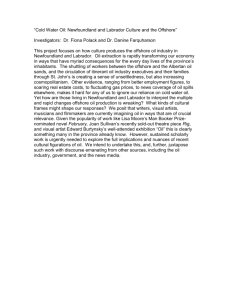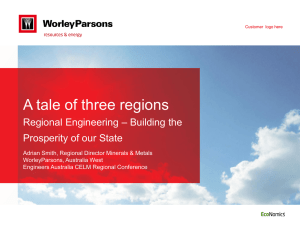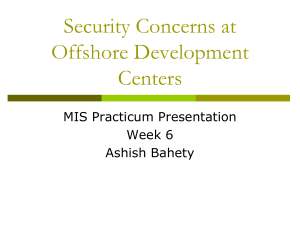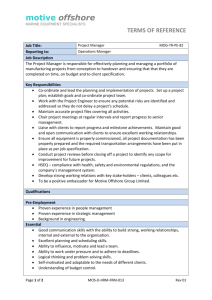Environmental Management in BP Operations
advertisement
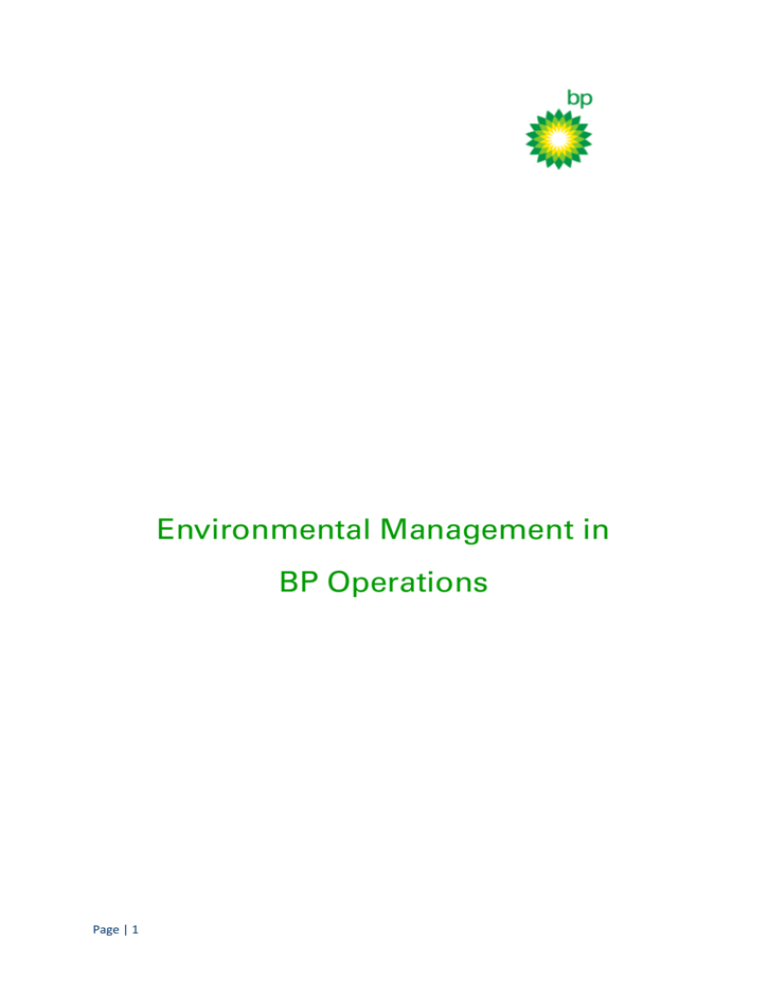
Environmental Management in BP Operations Page | 1 1. Introduction Dear ladies and Gentlemen, I am Faig Askerov, BP AGT Regional Director. Delivering energy to the world in a safe and responsible way is the goal of BP. And BP does it through implementation of Environmental and Social requirements for major projects and International protected areas, as well as through Operating Management System. Globally, BP made significant changes over the past few years since the Deepwater Horizon accident in 2010. We turned lessons learned into action, as well as shared knowledge and experience to the wider industry to help embedding the learning. In my presentation I shall highlight how BP environmental principles apply to Azerbaijan. BP office in Baku opened in 1992. ACG PSA was signed in September 1996. BP has led the consortium of international oil companies working in partnership with the government of Azerbaijan that has helped to make offshore Caspian one of the world’s leading hydrocarbon provinces. The first oil - November 1997. Currently, BP operates 6 oil and 1 gas platform at ACG and SD Contract area, 2 terminals – Sangachal in Azerbaijan, Supsa in Georgia, 2 oil export pipelines (BTC, WREP) and one gas pipeline (SCP). The length of subsea pipelines is equal to BTC pipeline. This development has stimulated social and economic progress in the region, bringing benefits to the people of Azerbaijan, Georgia and Turkey, and the region as a whole. In 2013 we had many tremendous achievements such as excellent production delivery, reliable plant, improved drilling performance, installation of the West Chirag platform, the Shah Deniz Stage 2 Final Investment Decision signing, and many more. To support production delivery, we are planning to deliver 19 new wells on ACG and Shah Deniz. 2. Approach to Environment BP HSE POLICY says: “No accidents, no harm to the people, no damage to the environment” Page | 2 Before starting project activities in the Contract areas we conduct thorough Environmental Baseline studies covering benthic and water biota, water and sediment chemistry We conduct Environmental and Social Impact Assessments (ESIAs) for all our projects and get approvals from a regulator We conduct our operations in line with Legal requirements and do this within Operating Management System (OMS) and externally certified Environmental Management System ISO 14001, including regular environmental internal and external audits conducted at operated areas/facilities. We conduct robust environmental monitoring program covering offshore, onshore and near-shore activities. Use of Best Available Technologies helps to protect environment. BP uses a number of such technologies to prevent and mitigate environmental impacts from Offshore projects and operations in the Azerbaijan sector of the Caspian Sea. For example: Drill Cuttings Re-injection (CRI) offshore, Produced Water (PW) injection offshore, Indirect Thermal De-sorption and Thermo-mechanical Cuttings Cleaner (TCC) for drill cuttings treatment We maintain consultations with public and stakeholders (SOCAR, MENR, NGOs, Academic Society) We cooperate with key country and regional environmental stakeholders 3. Key Environmental Challenges Flaring and Energy Efficiency ACG Performance is benchmarked with World Bank targets of 96% associated gas (AG) utilisation. AG Utilisation is currently 97.5%. Flaring is primarily for safety and essential maintenance. ACG accounts for 2% of total Regional (Russia, Kazakhstan, Azerbaijan etc.) Flaring and 0.5% of Global flaring. Our goal is to benchmark with the industry best in the North Sea by 2014 of around 2%. We completed Energy Efficiency studies for Sangachal Terminal and Offshore and are developing a woadmap. Produced Water Management PW is a challenging issue. We built Long Term Produced Water Plant to treat the onshoreseparated PW and export it to offshore via pipeline for reinjection. Over 90% of offshore PW treated by this plant and re-injected. There are plans in place to upgrade existing facilities and to identify alternative inshore options for managing PW in environmentally sound manner. We started joint efforts with SOCAR. Waste and Drill cuttings Management BP has a good waste management strategy and plans that allows tomanage waste in environmentally compliant and responsible manner. BP undertakes continuous improvements here, e.g. changeover from Indirect Thermal Desorption to Thermomechanical Cuttings Cleaner technology. BP is working with SOCAR to find better solutions and alternative options for waste disposal within SOCAR’s new project on Waste Management Facility at Garadagh. Offshore Sewage Management Over last few years Offshore Sewage Treatment Plants did not always work properly in our offshore platforms resulting in numerous outages and performance issues. It is was decided to do upgrades and consider replacement them with a new generation technology - STP Page | 3 based on membrane technology at all oil platforms in 2014-2015. This technology is already installed at our new West Chirag Platform. Oil Spill Response BP undertakes a number of environmental projects to help maintaining robust OSRP including Oil Spill Sensitivity Mapping project, studying dispersants, working with government to get agreement for new response tools such as sub-sea dispersants use and Controlled insitu burning. We established government engagement plan and organised a number of events for SOCAR, Ministry of Emergency Situations, Ministry of Environment and Natural resources, Cabinet of Ministry (Oil Spill Contingency and Response modelling tool training, Workshops on Oil Spill Response Strategies for the Caspian Sea and International Study on oil biodegrading microbes, etc.). 4. Cooperation in Caspian Caspian Environment Program We have a fruitful history of cooperation with Caspian Environment Program (Caspian/Tehran Convention Secretariat) that covers all littoral countries. BP/Partners financially contributed to setting up 1st CEP Project Coordination Unit in Baku. BP contributed to a number of projects - Trans-boundary Diagnostic Analyses, Biodiversity (seals and fish), Development of National and Regional Oil Spill Response Plan, Development of Caspian Convention, Workshop on Invasive species, Biomarkers Seminar etc. BP and partners shared a range of offshore and near-shore environmental data with the Caspian countries through helping to establish Caspian Environmental (Biodiversity) Information Centre (currently on-going project- BP has allocated fund for the 3nd phase of the project). Potential areas for future cooperation are Regional legislative and regulative frameworks (BP can make available BP developed Caspian-Specific Ecotoxicity Procedures, make available BP used Environmental Risk Assessment tools with Caspian countries etc.), data exchange, cooperation on Regional Emergency Response and Oil Spill Response. WB-GGFR We have been cooperating with World Bank and Global Gas Flaring Reduction (GGFR) Partnership Group and SOCAR on optimization of flaring performance since 2008. A number of joint Workshops, meetings and taken measures have resulted in establishing good communication, trustful relationship and improved flaring performance. Cooperation with SOCAR BP was able to establish excellent working relationship with Environmental team of SOCAR. BP-SOCAR environmental Working Group was set up for regular discussion of way forward and cooperation strategy on the subjects, such as Gas Flaring, Waste Management, Drill Cuttings Management, Produced Water, Capacity Building. 1. Capacity building. SOCAR representatives attended various trainings and awareness programs organised by BP; participated in Environmental monitoring Page | 4 and surveys implemented Offshore, Onshore and Near-shore; Cooperated within Joint WG and discussed environmental issues and shared experience and knowledge. 2. BP has supported the SOCAR’s proposal on Waste Management Facility at Garadag. BP is planning to contribute with 15 M USD to gain access to alternative solutions for waste management and and Drill cuttings Management. And just established a joint Working Group on Produced Water. 3. BP and SOCAR cooperation on Flaring Reduction has resulted in significant improvement of flaring performance at Chirag-1 (Chirag-1 platform is connected with SOCAR’s compression station at the Oily Rocks) and in ACG in general. I would like to thank Rafiga Huseynzade, SOCAR VP for Ecology for excellent cooperation with BP on environmental issues. These good relationship and fruitful cooperation established between environmentalists of SOCAR and BP allows to discuss and improve environmental issues, as well as share experience, knowledge and practice. Potential areas for future cooperation will include a) cooperation with SOCAR to build greater waste management capability and capacity in Azerbaijan through SOCAR’s new Waste Management Facility (WMF) project to manage challenging environmental issues, such as Produced Water, Drill Cuttings etc.; b) Oil Spill Response preparedness. Finally, the cooperation of all regional stakeholders on environmental issues is essential to accomplish sustainable development of the Caspian Region. Thank you for your attention. Page | 5
